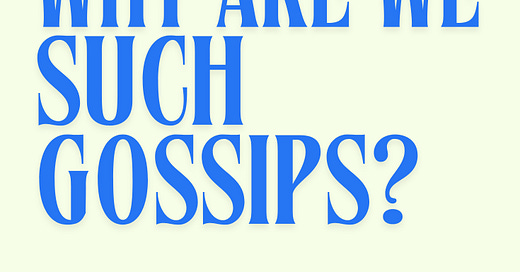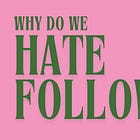Why are we such gossips?
Is gossip a healthy outlet or destructive habit, and does it make a difference if we do it online?
I often think about all of the different things that draw us to social media on a daily basis. There’s of course the positive — online communities, low-friction connection with friends and family, creative expression, entertainment. There’s the addictive — dopamine hits, infinite scroll, notifications.
Then, beyond that, there’s the yearn to be a part of something, the allure of watching other people’s lives, the low-stakes entertainment of observing dramas that don’t affect us personally.
Which is to say, there’s the gossip — the celebrity gossip, influencer gossip, gossiping about the drama unfolding on Facebook about a friend of a friend, forwarding Instagram Stories with a snarky message, watching relationships bud, watching them fall, scrolling through the comment section.
It’s a tale as old as time. Gossip wasn’t invented with the advent of the World Wide Web. We’ve been gossiping for as long as we’ve been humans. So why are we so drawn to gossip? Is it healthy or destructive? A natural inclination or a destructive habit?
Let us go down the rabbit hole.
Why do we gossip?
It’s easy to reduce the idea of gossip as a shallow habit. Yet, there’s a whole backstory to gossip that’s embedded in our DNA. From Time Magazine:
“Some researchers argue that gossip helped our ancestors survive. Evolutionary psychologist Robin Dunbar first pioneered this idea, comparing gossip to the grooming primates engage in as a means of bonding. Instead of picking fleas and dirt off one another to bond, Ludden explains, we now talk, which is ‘where gossip comes in, because chit-chat is mostly talking about other people and conveying social information.’ Gossiping, Dunbar’s work argues, gives humans the ability to spread valuable information to very large social networks. ‘Were we not able to engage in discussions of these [social and personal] issues, we would not be able to sustain the kinds of societies that we do,” she explained in a 2003 paper published in the Review of General Psychology. ‘Gossip in this broad sense plays a number of different roles in the maintenance of socially functional groups through time.’
What Dunbar is saying is that, evolutionarily, it’s two-fold: gossip can both build trust (ironic!) among communities, and it is necessarily for the growth of societies.
There’s also evidence that gossip can be a learning-tool. Or maybe more specifically, a tool to learn what not to do. When people behave badly, we are more prone to talk about it. People don’t want to be gossiped about, so in turn, they may learn what behaviors are more socially-unacceptable — say cheating.
From PsyPost, “Living under such conditions, our ancestors faced a number of adaptive social problems: who’s reliable and trustworthy? Who’s a cheater? Who would make the best mate? How can friendships, alliances and family obligations be balanced?” Essentially, gossip can play a role in culling bad behavior in societies by keeping people in check.
We don’t need to gossip now though, right?
Sure, there were benefits for our ancestors, but shouldn’t this be something we shed in modern society? We value protecting feelings at a much more considerable scale than we ever have historically. And gossip can hurt people.
Yet, researchers claim there are benefits even in 2025.
Easing loneliness: Again Time Magazine quotes, “‘In order to gossip, you need to feel close to people,” says Stacy Torres, assistant professor of sociology at the University of California, San Francisco. ‘There’s an intimacy’ to sharing experiences and feeling like you’re on the same page about others, she points out. Torres’ research has found that gossip can stave off loneliness, while other studies have found it can facilitate bonding and closeness and serve as a form of entertainment.”
Self-regulating after learning about an atrocity: A study cited in Time explains, “When subjects heard about another person’s anti-social behavior or an injustice, their heart rates increased. When they were able to actively gossip about the person, or the situation, on the other hand, it soothed them and brought their heart rates down. The act of gossiping, Feinberg explains, ‘helps calm the body.’”
Group bonding: PsyPost cites a study claiming that “In the workplace…harmless gossiping with one’s colleagues can build group cohesiveness and boost morale.”
Kelsey McKinney, former co-host of popular podcast Normal Gossip, is so convinced that gossip is good, she’s working to redefine the word with her new book, You Didn't Hear This From Me. McKinney is quoted in a New Yorker review of the book, “The goal of gossip about strangers is not to try people according to their secondhand deeds; it is to increase our own understanding of the world, to allow us to find enchantment and discovery in places we didn’t expect it.”
It’s a generous interpretation, I’ll give her that.
Because sure, at its most innocent, gossip can be all of these things — a balm from loneliness, a way to bond, an exercise in processing an experience, a way to understand the world. But at its more superficial core, it’s a damaging practice — both to the gossiper and gossiped.
Gossip.com
I can understand McKinney and other’s inclination to defend gossip. Let’s be honest, I, of course, engage in gossip. Now, I know to blame this on my human nature.
Yet, I began to wonder if there’s a difference between gossiping among close friends vs. the forms of gossip that occur online (celebrity gossip, influencer gossip, or plainly gossiping about something you only have reference from by seeing it on social media).
My first instinct was to determine that maybe online gossip is healthier because in most cases, we are removed from the situation. As I tried to defend that line of thinking, however, I realized how wrong that instinct was.
It feels more benign to engage in online gossip because often the subjects of our gossip are not people we know personally. The truth is we are, in fact, participating in all of the destruction without any of the benefits. It’s an inherently selfish version of gossip — we have shielded ourselves from any personal blow-back, and yet there’s another living, breathing person behind our shit-talk.
The New Yorker delves into this in their You Didn’t Hear This From Me review:
“McKinney uses the term ‘entitlement gossip’ to refer to the notion that the public has a right to personal information about famous people, a belief that has taken on increasingly vampiric manifestations in our age of social-media madness. She is talking about something darker, too: the illusion that ardent fandom constitutes a mutual relationship with its object. Fans mistake hearsay for news; they think that they know what is really going on with their idols, and sometimes they are right. The #FreeBritney movement, an instance of fan sleuthing that resulted in Britney Spears being sprung from the conservatorship established by her father, remains an astonishing example of rumor revealed to be reality. More often, however, they are wrong. McKinney is tough on the Gaylors, the subset of Swifties who brandish a cryptological analysis of lyrics, body language, and so on as proof that Taylor Swift is secretly a lesbian. Wishing doesn’t make it so; have we learned nothing from the phantom pee tape? That is another confusing thing about gossip. We like to think that it leads us closer to hidden truths, just to find ourselves pointed exactly the wrong way.
Celebrity gossip is only the tip of the iceberg. There are staggeringly large subreddits dedicated to gossiping about influencers (aptly dubbed snark subs). The comment sections and DM inboxes of both celebrities and influencers can be darkly filled with allegations, assumptions, and vitriol. Not to mention the way that teens wield gossip as a weapon, with social media as pure fuel to the fire. It’s hard to defend gossip as “healthy” when we see it’s manifestation online.
Maybe there are healthy ways to gossip. I won’t give you a self-righteous list of ways to gossip and keep your morality intact. The lines are blurry. You know what feels good. You know what is cruel.
But ultimately, even with the benefits gossip can provide, maybe we should consider better ways to stave off loneliness, to bond, to process the world, or as McKinney puts it, to “find enchantment and discovery in places we didn’t expect it.”
Simply opening our eyes to the world directly around us is, arguably, a more direct path to find enchantment and discovery, than say, hearing about it second-hand on the Internet.





This was such a good read! I remember reading Dunbar in college and was just as struck with gossip as an evolutionary necessity then as I am now. I have recently decided I absolutely do not care about influencer gossip and have started unfollowing those parts of the internet but then I feel incredibly disconnected! In the past year particularly, I've found myself on the outskirts of conversations because I didn't know that Kylie and TC started dating (and there seems to be a new swath of famous people I don't even know about).
This also had me thinking about how even 'gossiping among friends' can blue lines. I find myself going out to dinner with old friends from high school, college, etc and we spend a portion of the meal trading stories back and forth about people we used to know, based on who's still in our corner of the internet. Marriages, kids, business endeavors, etc. I think what Torres says about it being 'a form of entertainment' is spot on. I think it also helps me (us?) connect to who we once were, what our lives used to be, and so on.
I'm not proud! And I've recently (after the Break Free detox!) started unfollowing not only influencers but some of those people I haven't seen in 10+ years. Do I need to know that one girl in my sociology class moved from New York to New Jersey? I don't, lol. I also have kept reddit deleted from my phone since the detox, I didn't realize how addicting those snark threads can be (would sometimes find myself caught up in drama about people I hadn't even heard of!)